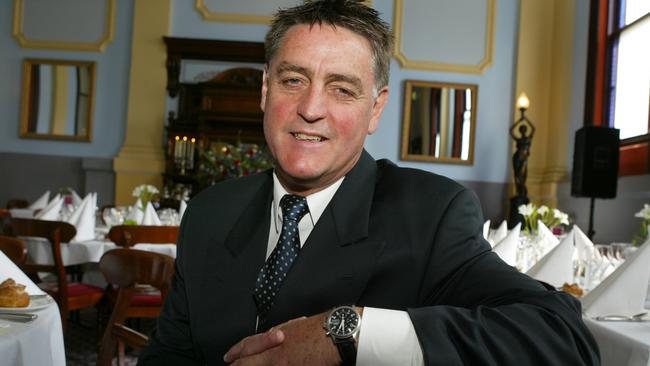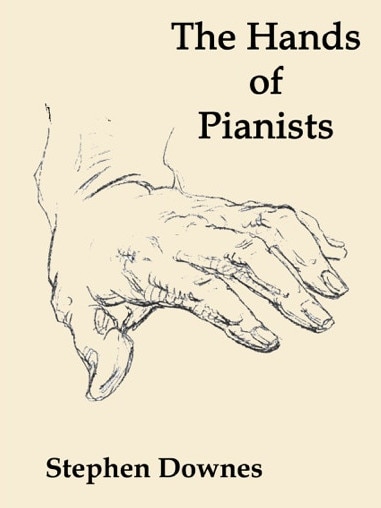Stephen Downes’ The Hands of Pianists a dark, dazzling drama by a master of lunacy
Stephen Downes was Australia’s most famous food critic. With his latest effort, we realise what a born artist we had in our midst.

Stephen Downes was Australia’s most famous food critic for as long as human memory stretches. He brought to the role a range of mind and a mastery of style that compelled wonder as to what else might be in him.
Now with The Hands of the Pianists, a black, melancholy, absolutely compelling literary novel, we realise what a born artist we had in our midst.
This book is a work of metafiction, a sustained exercise, virtuosic in its technique and grand in its achievement, that brings to mind with an unmistakeable shock of recognition the German ‘‘faction’’ of Thomas Bernhardt and WG Sebald.
Bernhardt had a style like Gertrude Stein and a sensibility like Fyodor Dostoyevsky’s notemaker from the underground and he contributes a note of berserk outrage, of all but uncontrollable intensity, to this novel.
Yet it’s Sebald, the essayist who uses life as a site for thematic meditation like a poet, who is Downes’s overwhelming influence. This book is an extraordinary inhabitation of another writer’s idiom and strategy.
Downes stands in relation to the author of The Emigrants and The Rings of Saturn the way John Webster, the author of The Duchess of Malfi, stands in relation to Shakespeare. Like Webster, he’s tough, he’s rugged, he’s often tracing the contour of a blackness of soul at the edge of hysteria or over it — but what a writer.
The Hands of Pianists is about the possibility of being a great pianist drives people to suicide or some other uncanny form of engineering their own death in a profoundly unheimlich world.
The starting point is the narrator remembering when he accidentally — or was it, he asks, in self-torture — cut off the fingers of his sister, who was an extraordinarily talented pianist. She subsequently killed herself.

From this Downes takes us on a besotted, nightmarish trip into the fates of potentially great pianists, either Australian or with Australian connections, who met untimely and tragic ends, including William Capell, Richard Farell and Noel Mewton-Wood.
The subject matter is potentially excruciating — and Downes does full justice to its heart-stopping horror — yet this is an exhilarating performance that creates pity and terror like a great actor rising to the challenge of King Lear or a great pianist to Beethoven or Bach at their starkest and most profound.
The novel is among other things a complexly variegated detective story. Do they all die at 31? Did this one engineer the plane crash? Or another the car to skitter to its doom? How can a third have sat down to drink a cocktail, so debonair, that included cyanide? Was it the loss of his male lover that drove him to his doom?
And throughout, relentlessly, there is the idea of the piano as an ascent to a scaffold.
Nor is there any avoidance of casual hyperbolic horror at some crazy reach of twisted sorrow: people raped and killed with great trunks of trees, the sweet smell of singed temples, after shock treatment, policemen beating delinquents with lead-filled rubber hoses.
It sounds horrific and it is but it goes along with a voice that is stately and composed, erudite in its command of the history of music, the trees of the world, the supremacies of craft in a 17th century choir stall. There is a tremendous capacity to capture shade and colour and cadence that bears comparison with the greatest nonfiction we have produced; with Robert Hughes, say.
If you like Sebald you will feel as if you are witnessing his resurrection. If your heart feels the electrifying drama of great piano playing, if you have ever felt a sense that the formal feeling of art comes out of great pain, you will want to read The Hands of Pianists.
It is a dark, dazzling drama about the melodramatics melancholy can engender, written with absolute gravity, grace and a moody, constantly surprising sense of wonderment.
It is about art and life in unholy hectic collision. Who could baulk at a man who can talk about the guzzleability of a fine beer, the apparition of Geoffrey Tozer and the soaring surprise of great architecture? Or the horrors of Kafka’s In The Penal Colony and the glories of AD Hope’s The Death of a Bird.
The Hands of the Pianists breaks every rule about art I know but it gets away with it. It’s scarcely suitable for adults let alone children but every school and municipal library in the country should rush to get hold of it.
It’s a sermon by a hell of a musician intimately suited to a time of plague. Its bell tolls but we are sustained by such a master of lunacy as Stephen Downes.
Peter Craven is a cultural critic.
The Hands of Pianists
Fomite, 274pp, $25.95



To join the conversation, please log in. Don't have an account? Register
Join the conversation, you are commenting as Logout